Kyle Quinn, an assistant professor of biomedical engineering, has received research funding from the National Institutes of Health in the form of a five-year, $1.7 million grant, which will be used to develop methods to predict age-related delays in skin wound healing. Non-healing wounds are a major health concern for older adults, and the natural aging process can contribute to problems or delays in healing.
Quinn's project will use label-free multiphoton microscopy to quantify and understand these age-related changes within wounds. Multiphoton microscopy enables 3-D imaging of skin metabolism and organization without the use of stains or dyes. This research builds off of the progress that Quinn and his colleagues have made in using multiphoton microscopy to evaluate impaired healing in diabetic wounds.
"We are extremely proud of Dr. Quinn and his research group," said Raj Rao, professor and department head of biomedical engineering. "Novel use of multiphoton imaging modalities for both basic and translational research is indeed exciting".
Said Quinn, "Both my NIH Pathway to Independence Award and seed funding from the Arkansas Biosciences Institute were integral to securing this R01 award from the NIH. Our long-term goal is to establish non-invasive optical readouts to identify age-related delays in healing and guide treatment. In collaboration with Dr. Ed Sander at the University of Iowa, we also aim to elucidate how age is associated with a susceptibility to mechanical re-injury through a combination of imaging, mechanical testing, and computational modeling." With multiphoton microscopy technology starting to make its way into the clinic, Quinn explained, the imaging methods and models he's working to develop have the potential for immediate impact in the clinical assessment and management of wounds.
"We are enthusiastic about our biomedical engineering faculty like Dr. Quinn and their sustained efforts towards securing NIH funding," said John English, dean of the College of Engineering. "I congratulate Dr. Quinn on this significant award and extend my sincere appreciation for his contributions to biomedical research in the college."
Jim Rankin, vice provost for research and economic development at the University of Arkansas, added, "This is outstanding news and a great follow-on for Kyle's NIH Pathway to Independence Award. Increasing our NIH funding is a major goal for the university and Kyle's impact is already being felt in the short time he has been at the university."
Topics
Contacts
Elizabeth DeMeo, media specialist
Department of Biomedical Engineering
479-575-4667, eademeo@uark.edu
